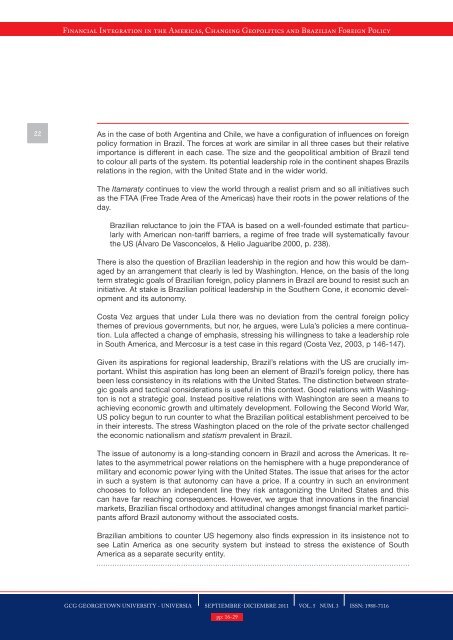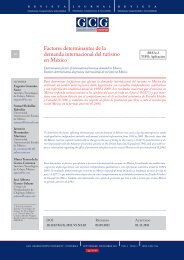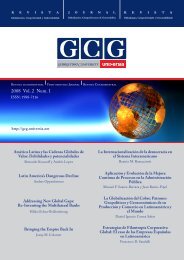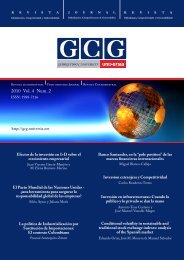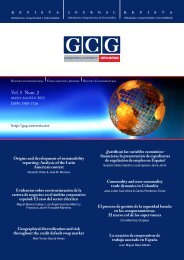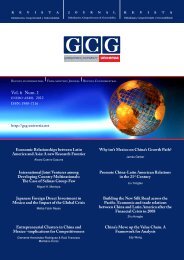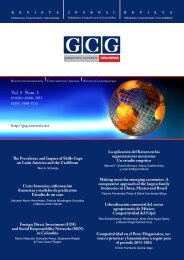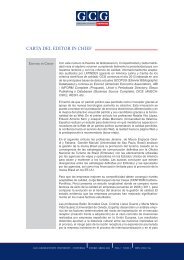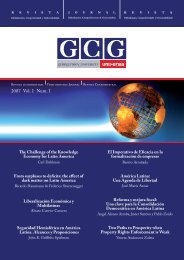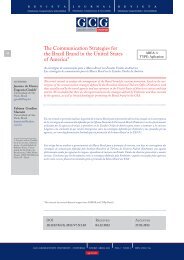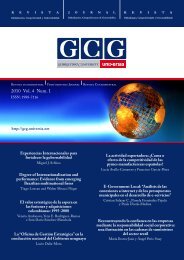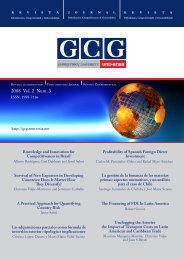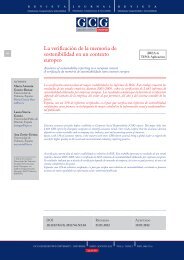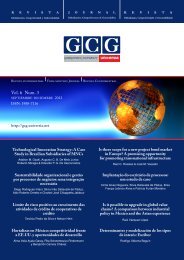Vol. 5 Num. 3 - GCG: Revista de Globalización, Competitividad y ...
Vol. 5 Num. 3 - GCG: Revista de Globalización, Competitividad y ...
Vol. 5 Num. 3 - GCG: Revista de Globalización, Competitividad y ...
- No tags were found...
You also want an ePaper? Increase the reach of your titles
YUMPU automatically turns print PDFs into web optimized ePapers that Google loves.
Financial Integration in the Americas, Changing Geopolitics and Brazilian Foreign Policy22 As in the case of both Argentina and Chile, we have a configuration of influences on foreignpolicy formation in Brazil. The forces at work are similar in all three cases but their relativeimportance is different in each case. The size and the geopolitical ambition of Brazil tendto colour all parts of the system. Its potential lea<strong>de</strong>rship role in the continent shapes Brazilsrelations in the region, with the United State and in the wi<strong>de</strong>r world.The Itamaraty continues to view the world through a realist prism and so all initiatives suchas the FTAA (Free Tra<strong>de</strong> Area of the Americas) have their roots in the power relations of theday.Brazilian reluctance to join the FTAA is based on a well-foun<strong>de</strong>d estimate that particularlywith American non-tariff barriers, a regime of free tra<strong>de</strong> will systematically favourthe US (Álvaro De Vasconcelos, & Helio Jaguaribe 2000, p. 238).There is also the question of Brazilian lea<strong>de</strong>rship in the region and how this would be damagedby an arrangement that clearly is led by Washington. Hence, on the basis of the longterm strategic goals of Brazilian foreign, policy planners in Brazil are bound to resist such aninitiative. At stake is Brazilian political lea<strong>de</strong>rship in the Southern Cone, it economic <strong>de</strong>velopmentand its autonomy.Costa Vez argues that un<strong>de</strong>r Lula there was no <strong>de</strong>viation from the central foreign policythemes of previous governments, but nor, he argues, were Lula’s policies a mere continuation.Lula affected a change of emphasis, stressing his willingness to take a lea<strong>de</strong>rship rolein South America, and Mercosur is a test case in this regard (Costa Vez, 2003, p 146-147).Given its aspirations for regional lea<strong>de</strong>rship, Brazil’s relations with the US are crucially important.Whilst this aspiration has long been an element of Brazil’s foreign policy, there hasbeen less consistency in its relations with the United States. The distinction between strategicgoals and tactical consi<strong>de</strong>rations is useful in this context. Good relations with Washingtonis not a strategic goal. Instead positive relations with Washington are seen a means toachieving economic growth and ultimately <strong>de</strong>velopment. Following the Second World War,US policy begun to run counter to what the Brazilian political establishment perceived to bein their interests. The stress Washington placed on the role of the private sector challengedthe economic nationalism and statism prevalent in Brazil.The issue of autonomy is a long-standing concern in Brazil and across the Americas. It relatesto the asymmetrical power relations on the hemisphere with a huge prepon<strong>de</strong>rance ofmilitary and economic power lying with the United States. The issue that arises for the actorin such a system is that autonomy can have a price. If a country in such an environmentchooses to follow an in<strong>de</strong>pen<strong>de</strong>nt line they risk antagonizing the United States and thiscan have far reaching consequences. However, we argue that innovations in the financialmarkets, Brazilian fiscal orthodoxy and attitudinal changes amongst financial market participantsafford Brazil autonomy without the associated costs.Brazilian ambitions to counter US hegemony also finds expression in its insistence not tosee Latin America as one security system but instead to stress the existence of SouthAmerica as a separate security entity.<strong>GCG</strong> GEORGETOWN UNIVERSITY - UNIVERSIA SEPTIEMBRE-DICIEMBRE 2011 VOL. 5 NUM. 3 ISSN: 1988-7116pp: 16-29


